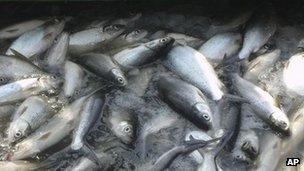Prince Charles addresses World Fisheries Congress in Edinburgh
- Published

Prince Charles wants urgent and collective action to protect fish stocks
Prince Charles has been addressing a major conference in Edinburgh on the future of sustainable fishing.
The Duke of Rothesay was speaking at the World Fisheries Congress in his role as the founder of The Prince's International Sustainability Unit.
He called for "urgent and collective action" to allow global fish stocks to recover.
The event is being attended by about 1,000 delegates from more than 65 countries around the world.
The prince warned global fisheries leaders that significant progress would only be achieved if governments, international institutions and even the smallest fishing communities work together.
Among those taking part in the conference is Scottish Environment Secretary Richard Lochhead and UK Fisheries Minister Richard Benyon.
Mr Lochhead said: "As one of the foremost fishing nations, Scotland is at the centre of international efforts to sustain the world's fisheries.
"Bringing together leading scientists and experts will provide stimulating and thought provoking discussions, and I look forward to building on our work and exchanging ideas with international partners."
He added that fishing made a "massive contribution" to Scotland's economy and stressed: "The Scottish government is committed to doing all we can to preserve the marine environment and to ensure a sustainable, long-term future for the fishing industry in Scotland."
The event is organised by the World Councils of Fisheries Societies.
A so called "report card" on the state of fish stocks was also launched at the conference.
The Marine Climate Change Impacts Partnership (MCCIP) brings together scientists, government, its agencies, non-governmental bodies and industry.
Its latest findings give clear indications that climate change is affecting fish stocks.
<link> <caption>The report </caption> <url href="www.mccip.org.uk/ffa." platform="highweb"/> </link> said warming sea temperatures were related to changes seen in the depth, distribution, migration and spawning behaviours of fish.
It said cultivated fish and shellfish were both susceptible to climate change.
The partnership also suggested controlled or closed fishing areas that can be adapted in response to climate change have the potential to help protect commercial and vulnerable fish stocks.
The report highlighted the wider impact of climate change on the wider marine food chain and said if some fish species, which are key to the integrity of food chains, are affected then extensive restructuring of the chains will follow.
UK Minister for the Marine Environment, Richard Benyon, said: "The truth is that climate change is having a big impact on distribution of fish stocks and this is going to present some significant challenges for policy-makers, fisheries managers and for fishing industry itself.
"The government will develop a National Adaptation Plan in response to the Climate Change Risk Assessment in which issues affecting the marine environment will be addressed."
Commenting on the MCCIP's findings, Rory Crawford, from RSPB Scotland, said: "The report card contains a timely reminder, as the seabird breeding season gets in to full swing, of the impacts of climate change on the marine food chain.
"For several years now we have seen worrying declines of sensitive species like kittiwakes, and many once-massive colonies in the Northern Isles have dwindled.
"We need to build resilience into our seabird populations in the face of these changes, and Marine Protected Areas are one of the essential tools that need to be used to improve the fortunes of this remarkable group of birds."
- Published4 February 2012
- Published3 February 2012
- Published27 January 2012